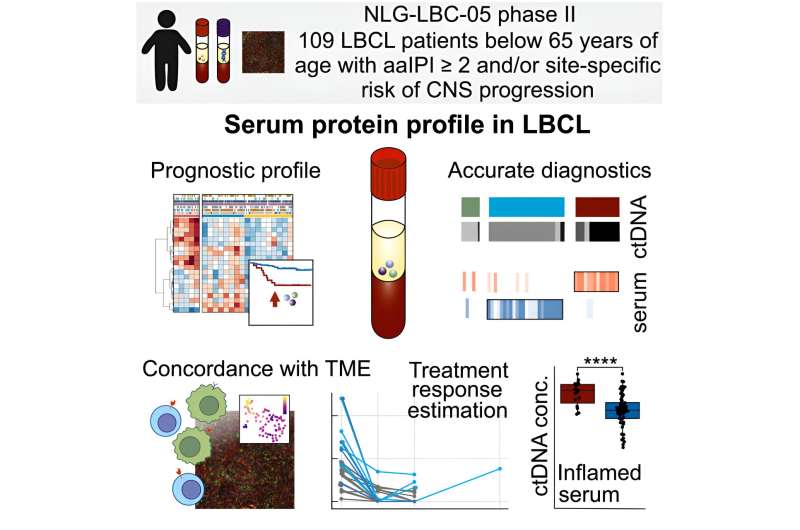This article has been reviewed according to Science X's editorial process and policies. Editors have highlighted the following attributes while ensuring the content's credibility:
fact-checked
peer-reviewed publication
trusted source
proofread
Blood samples enhance B-cell lymphoma diagnostics and prognosis, study shows

A recently completed study indicates that circulatory protein levels can provide important information for increasingly accurate diagnoses and personalized care in patients with aggressive B-cell lymphoma. Researchers at the University of Helsinki identified a specific protein profile linked to more severe disease.
B-cell lymphoma is the most common cancer of the lymphatic system. In roughly 30% of patients with aggressive B-cell lymphoma, the disease relapses. At the moment, risk profiling for the disease derives from clinical estimates, such as a risk classification based on the patient's age and general condition as well as disease stage.
However, these methods are not sufficiently accurate: patients with the highest risk may go undetected, and biological differences between lymphomas remain unexplored. Moreover, poor tissue samples can compromise exact diagnoses.
In a recently completed joint Nordic study, published in the journal Med, researchers at the University of Helsinki and Helsinki University Hospital investigated how blood samples from lymphoma patients could be utilized to improve the diagnosis and treatment of the disease. From blood samples of 109 patients with aggressive B-cell lymphoma, the researchers analyzed the levels of 1,400 proteins, or protein profiles.
The samples were collected before, at the mid-point, and at the end of the treatments. Subsequently, the researchers compared the samples with clinical data on the patients, the characteristics of the tumor tissue, and circulating tumor DNA originating in lymphoma.
In the blood samples, the researchers identified an inflammatory protein profile associated with poor survival, inflamed tumor tissue, and tumor burden. In addition, the researchers found that different subtypes of B-cell lymphoma can be classified based on the protein profiles obtained from blood samples.
The fact that protein data enables the monitoring of patients' response to treatment in the first place was an important observation.
"We found that the protein profiles of blood samples can help direct care to the patients who will most benefit from it. This technique would significantly boost personalized care, as it takes into account both the characteristics of tumor tissue and the patient's response to the disease," says Professor Sirpa Leppä from the University of Helsinki and HUS Helsinki University Hospital.
Disease recurrence observable in blood samples
According to Doctoral Researcher Maare Arffman from the University of Helsinki, protein profiles could be used to increase the accuracy of diagnoses in cases where a tissue specimen alone is not enough.
In addition, protein profiles can help patients in further care and follow-up observation. For example, a blood test could be used to determine whether proteins typical of the disease have reached their normal level at the end of treatment. Further measures could be planned according to patient needs.
"In practice, this could mean that it would be possible to monitor any potential relapses with the help of blood samples instead of imaging," Arffman says.
Next step: Clinical trials
The researchers point out that before the day-to-day utilization of protein profiles, their feasibility must be investigated in clinical trials.
Professor Leppä's research group is already planning to carry out a clinical study where they will employ blood samples in profiling lymphoma patients and personalizing care.
According to Leppä, the utilization of liquid biopsies in cancer research is a rapidly developing field.
"The proteins and circulating tumor DNA in blood samples have enormous potential for improving cancer diagnostics, refining patient risk profiling, and guiding treatment decisions," she says.
More information: Maare Arffman et al, Inflammatory and subtype-dependent serum protein signatures predict survival beyond the ctDNA in aggressive B cell lymphomas, Med (2024). DOI: 10.1016/j.medj.2024.03.007




















